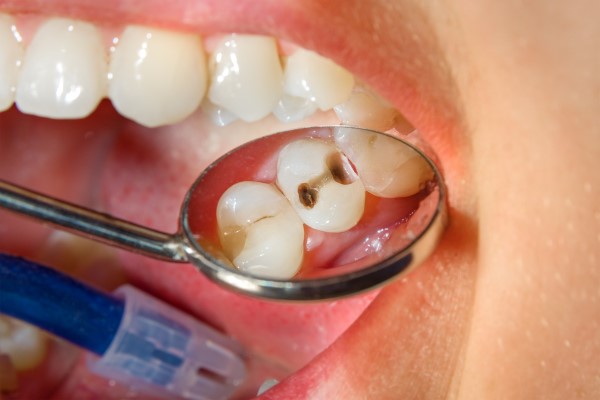3 Common Types of Cavities

Cavities are tiny holes that form on teeth surfaces due to acids made by oral bacteria eating away at their structures. They are one of the most common dental issues, with about 91% of people in the U.S. estimated to have at least one cavity.
Oral bacteria feast on the sugars in food particles stuck on teeth after meals, and they convert them into plaque and acids. The acids eat away at teeth until they are washed away by saliva, water, or brushing.
The different types of cavities
There are three main types of cavities that dentists often find themselves dealing with.
1. Root cavities
These form on teeth roots and are more common with older people, who are more likely to have receding gums. The condition leaves teeth roots exposed to acids made by oral bacteria, which begin to break them down. Teeth roots are not protected by enamel, like the crowns are. This makes them more vulnerable to tooth decay.
Dentists typically address cavities in the root by removing decayed material from the tooth and sealing the cavity with a filling. If the decay has made its way to the tooth’s pulp, a root canal might be performed. Root cavities tend to progress faster than other types due to teeth roots not having enamel to slow down the decay process.
2. Pit and fissure cavities
These types of cavities are often found on molars at the back of the mouth. They affect mostly the chewing surfaces of teeth, and food particles tend to get stuck in them. This speeds up the decay because oral bacteria get all the nutrients that they need inside the cavity to keep expanding it.
People with poor oral hygiene and children who might have not yet developed proper brushing habits are more likely to develop pit and fissure cavities. They can be treated with filling or prevented with dental sealants. If the cavity is allowed to progress, a root canal or an extraction might be needed to protect the patient’s oral health.
3. Smooth-surface cavities
These types of cavities form on the flat surfaces of teeth. They tend to progress slower than other types of cavities, and they are the least likely to occur. People with poor oral hygiene are most likely to develop these types of cavities. The sides of teeth get rinsed often, with saliva giving them additional protection against tooth decay.
Smooth surface cavities can often be treated with fluoride treatments, since it takes a while for the decay to get past enamel. When that occurs, a filling will be needed.
Cavities can also develop between the spaces between teeth. These types of cavities are more likely to form when a person does not include flossing as part of their oral hygiene routine.
Protect your teeth against cavities
Cavities can be easily treated with fillings, and preventative treatments like dental sealants help keep teeth cavity-free. Call or visit our Benicia clinic to learn more about how our dentist can protect your teeth from decay.
Request an appointment here: https://beniciadentist.com or call Southampton Dental Care at (707) 887-5075 for an appointment in our Benicia office.
Check out what others are saying about our dental services on Yelp: Cavities in Benicia, CA.
Recent Posts
A general dentist can help you to get past any toothache. Toothaches tend to occur as the worst possible times and they are usually an indicator there is something wrong with that specific tooth.Toothaches are often the result of a tooth being damaged by decay or trauma. It can also be a symptom of an…
Learning how to prevent cavities from a general dentist is smart. General dentists understand everything there is to know about how to take care of your mouth and are a great source of dental information. Whether you think you already have a cavity or want to make a preventive appointment to avoid getting a cavity…
It is common knowledge that oral health is important and includes regular visits to the general dentist. However, due to busy schedules, there is hardly any time to keep up with those appointments, especially if people do not know what to expect. Routine dental appointments help ensure that potential issues never develop or get out…
If a general dentist recommends fluoride treatments, patients may express concerns about the lasting effects of fluoride. They may also wonder whether eating and drinking are possible immediately afterward. Fortunately, fluoride is one of the easiest dental treatments to undergo with little to no waiting period and great benefits in the long term. Just a…


